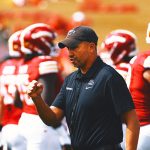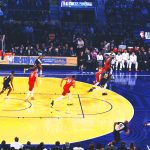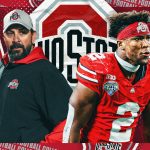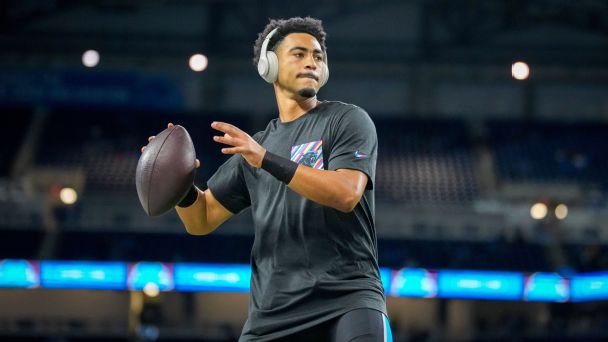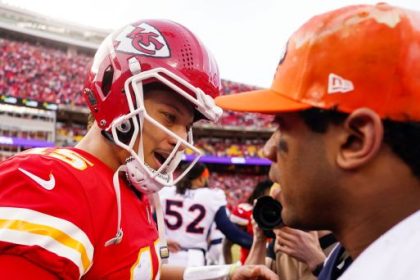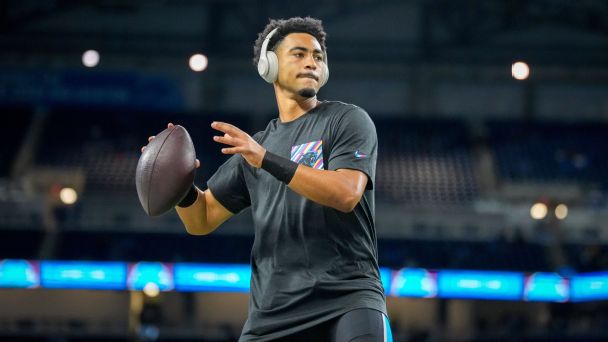
CHARLOTTE, N.C. — Carolina Panthers quarterback Bryce Young fell in love with the pass-happy offenses of the Pac-12 while growing up in California, so much so that he committed in July of 2018 to the University of Southern California, less than thirty minutes from his Pasadena home.
Then Tua Tagovailoa — who will be on the opposite sideline for Sunday’s game between the Panthers and Miami Dolphins in South Florida (1 p.m. ET, CBS) — burst onto the scene as Alabama’s star quarterback.
The rest is history.
Young visited the Tuscaloosa campus in September of 2019 and changed his commitment to Alabama. He did it because coach Nick Saban showed a willingness with Tagovailoa, the 2018 Heisman Trophy runner-up, to transition from his run-oriented ways to the pro-style, quarterback-centric offense that was taking over college football.
Four years later, Young was the No. 1 overall draft pick by the Panthers.
“It was a big transition from when he was there, just what the offense looked like and what Alabama moved to offensively,’’ Young said of Tagovailoa on Wednesday. “So that was a big reason for me being there.’’
Craig Young, Bryce’s father, said Alabama really wasn’t on the radar before then.
“The brand of football, frankly, was boring,’’ he said. “Seeing Tua there and how coach Saban would adapt and throw the ball made us feel really good about going there.’’
That Tagovailoa (6-foot-1, 227 pounds) was a shorter quarterback like Young (5-10, 205) also was a factor.
“You’re going to go to Alabama that has the best linemen, and potentially some of the best receivers, and also plays at the highest stage,’’ Craig Young said. “We thought that could be good for us on a lot of levels and prepare Bryce for the next level, and also to answer any of the questions about height and size that he still has to answer today.’’
Both Youngs agreed if it werent’ for Tagovailoa, Young never would have gone to the college where he won the Heisman Trophy in 2021.
They now hope Young’s NFL career heads in the same direction Tagovailoa’s has. He has a ways to go, though.
Young ranks last in the NFL in QBR at 28.6. He has thrown five touchdown passes and four interceptions, with three of the scores coming in Sunday’s 42-24 loss to the Detroit Lions.
The Panthers are 0-5 and Young missed one game due to a sprained ankle.
Tagovailoa ranks third in QBR at 75.6. He has 11 touchdown passes and five interceptions for a 4-1 Miami team that has the highest scoring average (36.2) after five games in the past eight years.
Tagovailoa never really struggled his rookie season like Young has. After beginning the season as the backup to veteran Ryan Fitzpatrick, he won his first three starts en route to a 6-3 record.
He is 25-14 overall despite injuries that forced him to miss eight games the previous two seasons.
But in college, the stats of Young and Tagovailoa almost mirrored each other their final two years as the starting quarterback.
Tagovailoa threw for 6,806 yards, 76 touchdowns and nine interceptions with a 70.2 completion percentage in 24 starts during the 2018-19 seasons.
Young threw for 8,200 yards, 79 touchdowns and 12 interceptions with a 65.5 completion percentage in 27 starts during the 2021-22 seasons.
“There are a lot of comparables,’’ said Greg McElroy, a college football analyst for ESPN and a member of Saban’s first Alabama team in 2007. “Both are soft-spoken. Both are humble, hard working and have strong influences from their family.’’
They also have similar football skills.
Carolina coach Frank Reich noted, “Both have quick release, accurate, can throw at different arm angles, get the ball all over the field. Good decision-makers, not runners but enough mobility to move the pocket and make the play.”
Tagovailoa wasn’t aware of his impact on Young’s decision to go to Alabama.
“That means a lot,’’ he said. “There’s things that he’s done, things at Alabama that I couldn’t even do. So for him to have won the Heisman, for him to do the things he’s done breaking records over there, it’s a testament of a family that he comes from, a testament of his hard work.”
McElroy gets why Young’s college choice was influenced by Tagovailoa.
“Tua was the first guy operating the [Alabama] offense in a very quarterback-friendly way and putting up gaudy passing stats,’’ he said.
He also noted Tagovailoa finished a close second to Oklahoma’s Kyler Murray in the 2018 Heisman voting. There had been only one Bama quarterback who was a finalist from 1993 until then.
“When you finally had a quarterback in the Heisman conversation, that was a big shift in the perception of that position at Alabama,’’ McElroy said.
Saban’s addition of Steve Sarkisian as offensive coordinator in 2019, Tagovailoa’s last season, also influenced Young switching to Alabama.
“We saw what Sark could do,’’ Craig Young said of Sarkisian, who spent much of his early coaching career at USC. “Watching Tua’s tape, you could see how Bryce’s skill set could transfer.’’
With the Crimson Tide’s rise in passing-game success came an increase in Alabama quarterbacks starting in the NFL. There currently are four: Young, Tagovailoa, Jalen Hurts (Philadelphia Eagles) and Mac Jones (New England Patriots).
All but Hurts (Round 2, 2020) were taken in the first round. Young is the only Alabama quarterback to go No. 1 overall.
Tagovailoa didn’t take all the credit for changing Alabama’s quarterback image.
“It was really the guys I had surrounding me,’’ he said. “Before I got there, Alabama was not necessarily known for throwing the ball downfield, more so ground and pound … and, sort of, it’s the defense that makes Alabama.
“As coach Saban recruited guys while we were there, I would say those guys have seen what we were able to do. It was one of those things, ‘Oh, yeah. Alabama is not just a ground-and-pound team. They do throw the ball, and they throw it a lot.’
Since 2018, Alabama’s pro-style offense has produced seven first-round wide receivers — Calvin Ridley, Jerry Jeudy, Henry Ruggs III, Jaylen Waddle, Pat Surtain II, DeVonta Smith and Jameson Williams.
Before that, Saban had two — Amari Cooper in 2015 and Julio Jones in 2011.
“Tua had more NFL wide receivers, and Alabama utilized it,’’ Craig Young said. “We decided we would love to be a part of that.’’
McElroy noted Tagovailoa’s NFL game didn’t really take off until the Dolphins added star wide receivers Tyreek Hill and Waddle.
He believes Young’s career will take off the same way once Carolina adds talent like that.
“Tua was just a guy until they got Hill and Waddle,’’ McElroy said. “[Cincinnati Bengals QB] Joe Burrow was just a guy until they got [WR] Ja’Marr Chase. You can’t play well now in the NFL without a really dynamic receiving corps.’’
ESPN Dolphins reporter Marcel Louis-Jacques contributed to this story.

